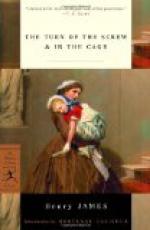There was accordingly a sense in which, at such a period, the great differences of the human condition could press upon her more than ever; a circumstance drawing fresh force in truth from the very fact of the chance that at last, for a change, did squarely meet her—the chance to be “off,” for a bit, almost as far as anybody. They took their turns in the cage as they took them both in the shop and at Chalk Farm; she had known these two months that time was to be allowed in September—no less than eleven days—for her personal private holiday. Much of her recent intercourse with Mr. Mudge had consisted of the hopes and fears, expressed mainly by himself, involved in the question of their getting the same dates—a question that, in proportion as the delight seemed assured, spread into a sea of speculation over the choice of where and how. All through July, on the Sunday evenings and at such other odd times as he could seize, he had flooded their talk with wild waves of calculation. It was practically settled that, with her mother, somewhere “on the south coast” (a phrase of which she liked the sound) they should put in their allowance together; but she already felt the prospect quite weary and worn with the way he went round and round on it. It had become his sole topic, the theme alike of his most solemn prudences and most placid jests, to which every opening led for return and revision and in which every little flower of a foretaste was pulled up as soon as planted. He had announced at the earliest day—characterising the whole business, from that moment, as their “plans,” under which name he handled it as a Syndicate handles a Chinese or other Loan—he had promptly declared that the question must be thoroughly studied, and he produced, on the whole subject, from day to day, an amount of information that excited her wonder and even, not a little, as she frankly let him know, her disdain. When she thought of the danger in which another pair of lovers rapturously lived she enquired of him anew why he could leave nothing to chance. Then she got for answer that this profundity was just his pride, and he pitted Ramsgate against Bournemouth and even Boulogne against Jersey—for he had great ideas—with all the mastery of detail that was some day, professionally, to carry him afar.
The longer the time since she had seen Captain Everard the more she was booked, as she called it, to pass Park Chambers; and this was the sole amusement that in the lingering August days and the twilights sadly drawn out it was left her to cultivate. She had long since learned to know it for a feeble one, though its feebleness was perhaps scarce the reason for her saying to herself each evening as her time for departure approached: “No, no—not to-night.” She never failed of that silent remark, any more than she failed of feeling, in some deeper place than she had even yet fully sounded, that one’s remarks were as weak as straws and that, however one might indulge in them at eight o’clock,




